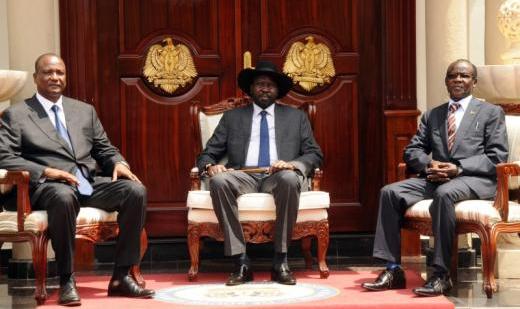President Kiir grants creation of cantonment sites in Bahr el Ghazal region

September 23, 2016 (JUBA) – South Sudanese President, Salva Kiir, and his chief of general staff, Paul Malong Awan, have eventually accepted the creation of the cantonment sites for the armed opposition fighters in his home region of Bahr el Ghazal, according to senior officials.
It remains unclear what prompted the sudden change of heart after a long intransigence and insistence to not allow the creation of the assembling points or areas for the armed opposition faction of the Sudan People’s Liberation Army (SPLA-IO) led by his former first deputy, Riek Machar.
Establishment of cantonment areas for the SPLA-IO was one of the key sticking matters which stalled the implementation of the security arrangements in the country.
Several government officials, including the president, were previously keen to advance narratives that Bahr el Ghazal and Equatoria regions, unlike Upper Nile region, were not active military combat zones during the more than two years, despite the presence of leading politicians and prominent figures with a significant military and political following from the two regions in the movement.
The differences and delays to reach a consensus resulted in the building up of tension which escalated to deadly clashes in Juba after rival forces traded statements depicting the other to have initiated provocative acts against the other.
Observers interpreted the sudden change of heart to mean attempts by Kiir and his military and political confidants to portray opposition leader Machar as the cause for the delay.
South Sudan army spokesman, Brigadier General Lul Ruai Koang, told reporters on Friday that four cantonment sites will be established in greater Equatoria region and two others in Bahr el Ghazal.
These cantonment sites, according to the military spokesman, will be used by armed opposition fighters to whom he referred to as “SPLM/A-IO peace wing” under the command and leadership of the newly appointed first vice president, Taban Deng Gai. The military spokesman referred to Machar’s group as “warmongers” to be dealt with.
Meanwhile Gen. Augustino S.K. Njoroge, deputy head of the Joint Monitory and Evaluation Commission (JMEC), a body charged with responsibility to overseeing implementation of the peace agreement in South Sudan by the regional leaders, announced on Thursday the two sides have agreed in principle during a two-day workshop in Juba to work out all the requirements set out by the UN Security Council resolution on the deployment of a regional protection force in Juba.
The two-day workshop, he said, brought together politicians and military commanders to review proposals and make recommendations for realignment of transitional security arrangements for Juba, including how to introduce the UN regional protection force and realignment of security arrangements.
Njoroge reaffirmed commitment of the monitoring body to work out details of specific tasks. He described the conduct of the workshop as successful and has achieved all the objectives for which it was organised and conducted for the stakeholders in the peace agreement.
“We have received a joint briefing from the parties on their shared concept of Juba security arrangements whose details can now be fine-tuned and actualized,” Njoroge told reporters.
He commended the parties in Juba for recommitting to the peace process, while appreciating the international community for supporting the people of South Sudan to realize peace and stability.
The peace monitoring official confirmed receiving a detailed briefing and government proposal for the cantonment, verification and demobilization of forces with approval for establishment of cantonment sites in previously contested areas in the Equatoria and Bahr al Ghazal regions.
He also pointed out that the proposal provides a useful starting point and sets out clear steps and challenges to be addressed by the parties in the event of disagreement during the cause of implementation.
Another document they received, he said, was a realignment concept note of operations for United Nations mission in the country and the regional protection force that compliments the JMCC plan.
The deputy head of JMEC revealed that the parties also agreed in principle on the matter of forces required in Juba, redeployment of forces and commitment to jointly working through the technical details of armament types and the numbers at JMCC and UNMISS levels.
The workshop developed a very clear task and timelines for operationalizing the proposed security arrangements to be worked out in future details by JMCC, UNMISS, CTSAMM and Transitional government of national unity to finalize implementation of the UN Security Council resolution.
(ST)
